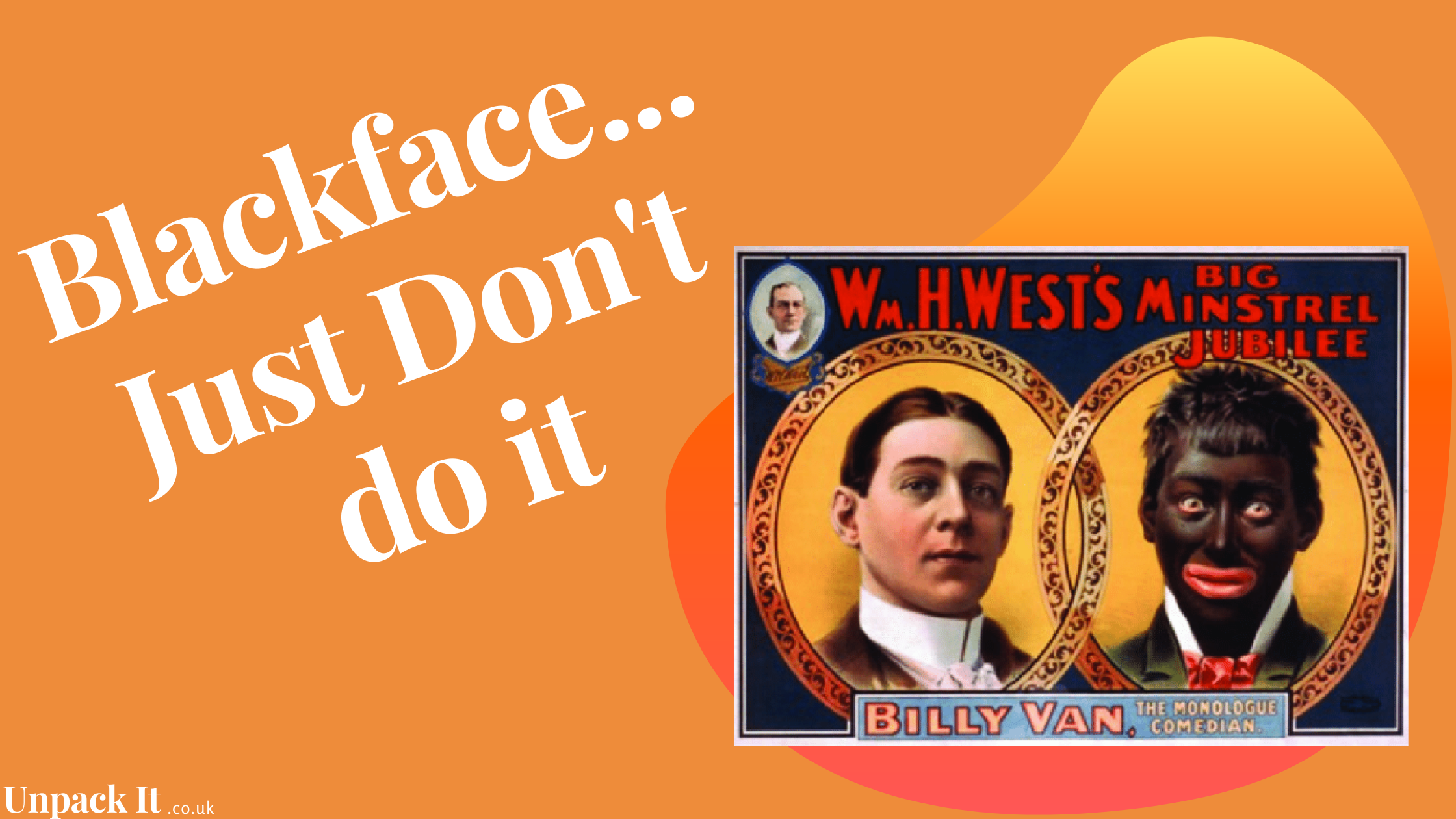Although widely regarded as inappropriate, blackface is used in contemporary society by those who think it’s harmless and a bit of fun. Some may be completely ignorant to the insensitivity of it, others would rebel that it is free expression. Blackface is commonly used for Halloween costume parties and fancy dress parties which. In these spaces, blackface can often be tolerated as people may view it as a harmless portrayal. However, to say there is no harm in dressing in blackface is to neglect its racist history of degrading and mocking black people. The deep rooted racism behind blackface reinforces values of white superiority whilst dehumanising the black ‘other’.
The History
It is important to understand the history of blackface before looking at the impact it has on today. As stated by George Santayana, the Spanish-American Philosipher, ‘Those who do not learn from history are doomed to repeat it’.
Blackface origins date back to the 19th century American Minstrel Shows. In these shows, white entertainers dressed as black people and mock their intelligence, dialect, features and more. The entertainers would paint themselves with coal, burnt cork or shoe polish and overpaint their lips in red or white paint to give the appearance of large lips. Minstrel Shows were popular with their white audiences as they enjoyed the lazy, ignorant, cowardly portrayal of black people. It also reinforced their ideas of black people being inferior and that they should be treated inhumanely.
The portrayals of black people in Minstrel shows were designed to make the audience laugh at their life. It downplayed the harsh realities of slavery as they were depicted as happy, simple minded slaves. However, these stereotypes would significantly shape the way society would view and treat black people for decades to come.
But that was then and this is now, what’s the relevance?
Though a 200 year old show, it wasn’t too long ago minstrelsy was last seen aired on national television. The show went on to as late as 1978, then named as The Black and White Minstrel Show on the BBC. This proves how big of an impact it had on society as it aired on TV for over 150 years. This form of entertainment is no longer socially acceptable and is regarded as overt racism. Yet we still find instances of people dressing in blackface at fancy dress parties.
“But my intention wasn’t to be racist. I had no idea about its history. It was just a joke”. While those that have taken part in blackface may not deem themselves as racist, it doesn’t change the impact it has on those who see it.
Choosing to wear blackface maintains the stereotyping and marginalizing towards black people. As mentioned in this Do Something article, ‘it’s a practice nothing short of ignorant and degrading, and participating in it directly supports and prolongs its racist legacy.’
Therefore it shouldn’t be brushed off with the excuse of “I didn’t mean it” but instead questioning “did I cause harm?”
By airing such a show on a worldwide scale, gave the public justification that it was the norm to mock black people. It reinforced stereotypical perceptions that the black ‘other’ was unworthy of empathy because they were out of society’s ideals to even be considered as a human being with emotions.
It’s dehumanising!
Wearing it for humorous purposes is degrading and construes black people as property, unworthy of dignity. This ties in all too close to the history of slavery and segregation where blacks were disregarded as human. Additionally, to tell a minority group who has been marginalised throughout history to not get offended is not only utterly insensitive, but an act of privilege. Black people aren’t able to forget their painful history, especially when they experience it first hand. So for white people to ignore the history and are unwilling to learn it, claim their privilege to overlook the situation out of convenience.
Blackface is part of a history of dehumanization, of denied citizenship, and of efforts to excuse and justify state violence. From lynchings to mass incarceration, whites have utilized blackface (and the resulting dehumanization) as part of its moral and legal justification for violence. It is time to stop with the dismissive arguments those that describe these offensive acts as pranks, ignorance and youthful indiscretions. Blackface is never a neutral form of entertainment. But an incredibly loaded site for the production of damaging stereotypes. The same stereotypes that undergird individual and state violence, American racism, and a centuries worth of injustice. – HuffPost
Suggestions
Don’t wear blackface! John Dana says in his azcentral article, ‘Using repulsive stereotypes about another person’s race or culture not only diminishes their humanity, but yours.’ The colour of someone’s skin is not your costume to put on and take off whenever you please. It is not a novelty.
It’s not about if you believe you’re not racist or that you didn’t intend to offend anyone because you thought it was harmless. It’s about how you made someone else feel and the unsealed wounds that are associated with it.
So if you still don’t understand why Blackface is outright wrong, ask yourself: what is funny about blackface? What pleasure do you get out of it and why?
Share post



